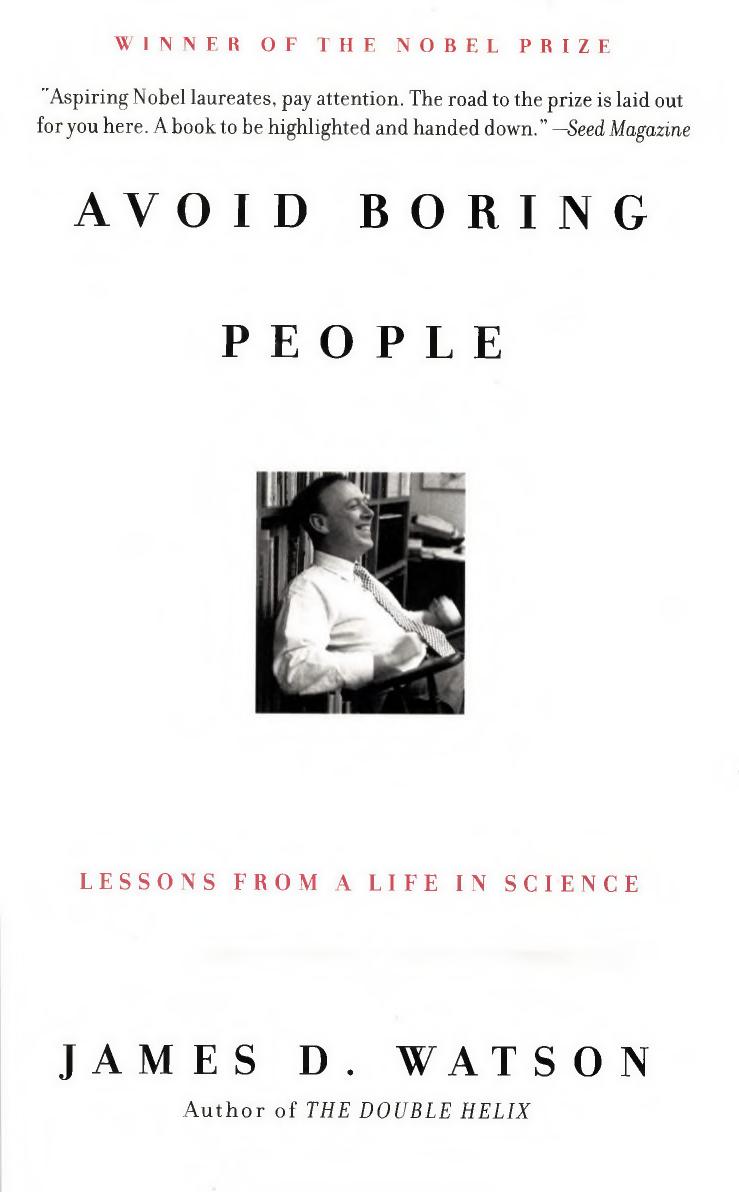Avoid Boring People: Lessons from a Life in Science by James D. Watson

Author:James D. Watson
Language: eng
Format: mobi, epub, pdf
Tags: Autobiography, Life Sciences, Scientists - General, Molecular Biology, Biochemistry, SCIENCE, Science & Technology, Biology, Life Sciences - Biology - Molecular Biology, General, Dna (Deoxyribonucleic Acid), Personal Memoirs, Scientists, Biography & Autobiography, Biography
ISBN: 9780375727146
Publisher: Random House, Inc.
Published: 2010-08-15T07:00:00+00:00
10. MANNERS APPROPRIATE FOR A NOBEL PRIZE
INDIVIDUALS nominated for Nobel Prizes are not supposed to know their names have been put forward. The Swedish Academy, which judges candidates and awards the prize, makes this policy very explicit on their nomination forms. Jacques Monod, however, could not keep secret from Francis Crick that a member of the Karolinska Institutet in Stockholm had asked him to nominate us in January for the 1962 Nobel Prize in Physiology or Medicine. In turn, Francis, when visiting Harvard that February to give a lecture, let the cat out of the bag at a Chinese restaurant where we were having supper. But he told me we should say nothing to anyone, lest it get back to Sweden.
That we might someday get the Nobel Prize for finding the double helix had been bruited about ever since our discovery. Just before my mother died in 1957, she was told by Charles Huggins, then the University of Chicago's best-known physician-scientist, that I was certain to be so honored. Though many were initially skeptical that DNA replication involved strand separation, this doubting chatter went silent after the 1958 Meselson-Stahl experiment demonstrated that very phenomenon. Certainly the Swedish Academy had no doubt as to the correctness of the double helix when they awarded Arthur Kornberg half of the 1959 Physiology or Medicine prize for experiments demonstrating enzymatic synthesis of DNA. When photographed shortly after learning of his Nobel, a beaming Kornberg held a copy of our demonstration DNA model in his hands.
As the October 18 date for announcing the year's Nobel in Physiology or Medicine approached, I was naturally jittery. Conceivably the responsible Swedish professors had requested more than one nomination, reflecting split opinions during preliminary caucusing. Nonetheless, as I went to bed the night before the prize announcement, I couldn't help fantasizing about being awakened by an early morning phone call from Sweden. Instead a nasty cold I'd caught awakened me prematurely, and I was depressed to realize at once that no word had come from Stockholm. I remained shivering under my electric blanket, not wanting to get up when the telephone rang at 8:15 A.M. Rushing into the next room, I happily heard a Swedish newspaper reporter's voice tell me that Francis Crick, Maurice Wilkins, and I had won the Nobel Prize for Physiology or Medicine. Asked how I felt, all I could say was, “Wonderful!”
First I phoned Dad and then my sister, inviting each to accompany me to Stockholm. Soon after, my telephone began to buzz with congratulatory messages from friends who had already heard the news on the morning broadcasts. There were also calls coming from reporters, but I told them to try me at Harvard after I'd given my morning virus class. I felt no need to rush through breakfast with Dad, so the class hour was almost half over when I walked in to find an overflowing crowd of students and friends anticipating my arrival. The words Dr. Watson has just won the Nobel Prize were on the blackboard.
Download
Avoid Boring People: Lessons from a Life in Science by James D. Watson.epub
Avoid Boring People: Lessons from a Life in Science by James D. Watson.pdf
This site does not store any files on its server. We only index and link to content provided by other sites. Please contact the content providers to delete copyright contents if any and email us, we'll remove relevant links or contents immediately.
| Cell Biology | Developmental Biology |
| Entomology | Marine Biology |
| Microbiology | Molecular Biology |
| Biostatistics |
Sapiens: A Brief History of Humankind by Yuval Noah Harari(14356)
The Tidewater Tales by John Barth(12643)
Mastermind: How to Think Like Sherlock Holmes by Maria Konnikova(7312)
Do No Harm Stories of Life, Death and Brain Surgery by Henry Marsh(6931)
The Thirst by Nesbo Jo(6921)
Why We Sleep: Unlocking the Power of Sleep and Dreams by Matthew Walker(6689)
Life 3.0: Being Human in the Age of Artificial Intelligence by Tegmark Max(5539)
Sapiens by Yuval Noah Harari(5358)
The Body: A Guide for Occupants by Bill Bryson(5069)
The Longevity Diet by Valter Longo(5057)
The Rules Do Not Apply by Ariel Levy(4950)
The Immortal Life of Henrietta Lacks by Rebecca Skloot(4570)
Animal Frequency by Melissa Alvarez(4457)
Why We Sleep by Matthew Walker(4426)
The Hacking of the American Mind by Robert H. Lustig(4361)
Yoga Anatomy by Kaminoff Leslie(4353)
All Creatures Great and Small by James Herriot(4303)
Double Down (Diary of a Wimpy Kid Book 11) by Jeff Kinney(4257)
Embedded Programming with Modern C++ Cookbook by Igor Viarheichyk(4165)
